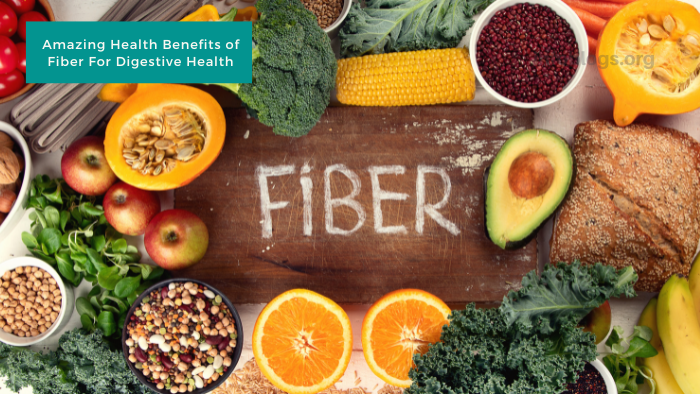In this article, we will dive into the amazing health benefits of fiber and sources from where we get our daily dose of fiber.
The overall health and well-being of an individual heavily relies on a properly functioning digestive system. Fiber, an essential component, plays a crucial role in maintaining digestive health. It is a type of carbohydrate that remains mostly undigested as it passes through the digestive system.
What is Fiber and Why is it Important?
Fiber, a type of complex carbohydrate present in plant-based foods, differs from other carbs as it is not digested or absorbed by the body. Instead, it passes through the digestive system without breaking down, offering various advantages. Fiber can be classified into two categories: soluble and insoluble. Soluble fiber dissolves in water and creates a gel-like substance, while insoluble fiber increases stool volume.
Benefits of Fiber for Digestive Health:
a. Enhances Bowel Regularity: The inclusion of fiber in your diet increases the volume of your stool, preventing constipation and promoting regular bowel movements. Additionally, it can provide relief from symptoms associated with conditions such as irritable bowel syndrome (IBS) and hemorrhoids.
b. Sustains Bowel Well-being: Consuming a high-fiber diet is linked to a decreased likelihood of developing conditions like diverticulitis, diverticulosis, and colorectal cancer.
c. Fiber supports the health of the gut by acting as a prebiotic, nourishing beneficial bacteria in the gut. This is important for maintaining a healthy balance of gut flora, which is essential for optimal digestion and absorption of nutrients.
d. Soluble fiber plays a role in controlling blood sugar levels by slowing down the absorption of glucose. This can help regulate blood sugar levels and potentially decrease the likelihood of developing type 2 diabetes.
e. Including high-fiber foods in your diet can aid in weight management as they are typically lower in calories and provide a greater feeling of fullness, promoting satiety.
Dietary Sources of Fiber:
a. Fiber can be found in a variety of fruits and vegetables such as berries, apples, pears, oranges, broccoli, carrots, and leafy greens.
b. Including whole grains like whole wheat, brown rice, oats, quinoa, and barley in your diet is a great way to increase your fiber intake. Consider choosing whole grain bread, pasta, and cereals.
c. Legumes like beans, lentils, chickpeas, and peas not only provide plant-based protein but are also excellent sources of fiber.
d. Incorporating fiber-rich nuts and seeds such as almonds, chia seeds, flaxseeds, and pumpkin seeds into your meals can be beneficial for your diet.
e. Adding concentrated sources of fiber like wheat bran, oat bran, and rice bran to different dishes can help increase your fiber consumption.
Tips for Increasing Fiber Intake:
a. Gradually increase your fiber consumption to allow your digestive system to adapt, as sudden and significant changes may lead to bloating or gas.
b. Opt for whole fruits, vegetables, and grains instead of processed or refined options, as they contain higher amounts of fiber.
c. Ensure to read food labels and choose products that have a higher fiber content.
d. Enhance your meals by adding berries or sliced fruits to your breakfast, incorporating various vegetables into your dishes, and including legumes in soups, salads, or stews.
e. To prevent constipation, it is important to stay hydrated by drinking plenty of water when increasing your fiber intake.
Conclusion:
The benefits of fiber are numerous and include supporting digestive health, promoting regular bowel movements, maintaining bowel health, supporting gut health, controlling blood sugar levels, and managing weight. To enjoy these benefits, it is important to incorporate fiber-rich foods into our diets. These foods include fruits, vegetables, whole grains, legumes, nuts, and seeds. It is recommended to gradually increase fiber intake, stay hydrated, and choose whole foods in order to support optimal digestive health and overall well-being.


